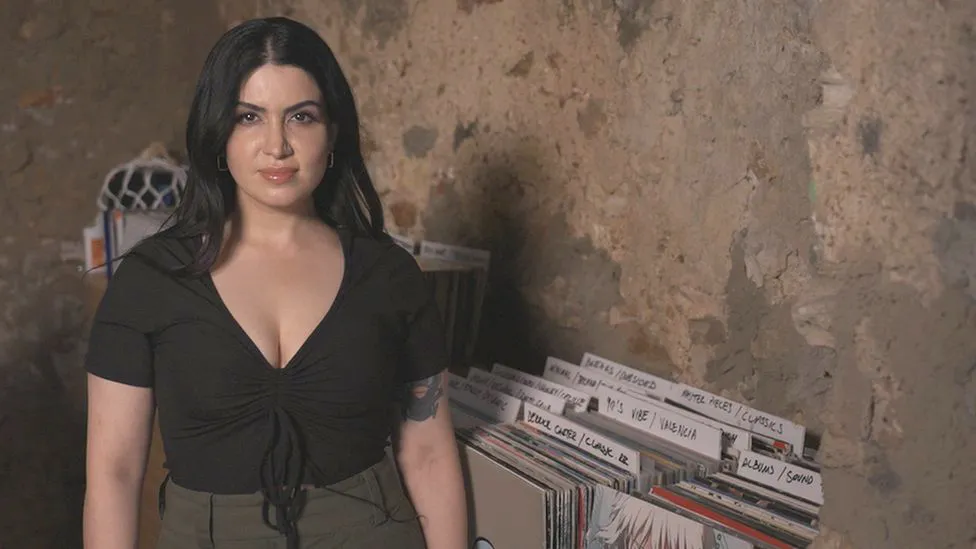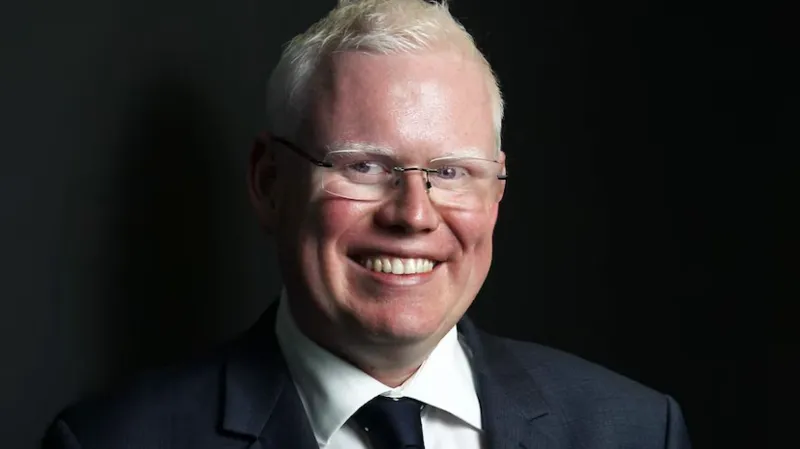The Iranian female DJs shaking the dance floor and breaking taboos
Mixed-sex raves are illegal in Iran but they happen anyway - far away from the prying eyes of the morality police - and some of the female DJs getting the crowds dancing are also breaking taboos and pushing cultural boundaries.

Iran's 1979 Islamic Revolution turned the country's cultural life upside-down.
Pop music, deemed non-revolutionary, was banned, so many musicians fled. At the same time it was declared sinful, or haram, for women to sing.
A thriving pop and cabaret scene died almost overnight. And yet, behind closed doors, some things continued as before.
"Indecent" music cassettes and CD were smuggled into the country from abroad, delivered secretly to people's homes. Then, once dinner was over, lights would be dimmed and living rooms became dance floors.
"I was the dancing star at every mehmooni [family party]," says Paramida, now a Berlin-based DJ, producer and record label owner.
Paramida's mother had left Iran because she didn't want her daughter to live in a country "where women were treated so badly". The mandatory wearing of the hijab was only one of a number of restrictions she opposed.
She settled in Germany, but in 2002 she had to return for family reasons, and for four years Paramida went to school in Tehran. Before long, she wasn't only dancing at home, but attending underground parties.
"We all split up in cars, boys in some cars and girls in others. We drove out the city. And then we just set up music and lights and everyone was dancing and that was it," says Paramida.
From the late 1990s a new kind of party culture had begun to develop in Iran. With the arrival of illegal satellites came music channels such as MTV, and an underground rave scene soon emerged.
"For the first time, I went to a party and a DJ was playing house music," remembers Nesa Azadikhah, a 40-year-old DJ born and raised in Tehran.
"I was looking at him all the time and thinking to myself: 'I would like to have that job.'"
A few years later, Nesa was one of the first Iranian women to DJ in underground "free parties" - house and techno music gatherings in private venues that were by invitation only.
In the early days, the parties mostly took place in the ski village of Shemshak, nicknamed "Shibiza" after the Spanish island Ibiza and its world-famous club scene.
But partying in Iran is a crime. Although it isn't listed in the penal code, people are frequently arrested at underground gatherings, and charged with consuming alcohol or mingling with people of the opposite sex - offences that can be punished with fines, prison sentences or lashes.
It's not known how many arrests of this kind occur every year, but 300 partygoers were detained at a single underground event last November, according to local news agencies.
And just days ago, on 5 March, it was reported that at least 11 students from a top university were arrested at a mixed gender party and suspended for up to three semesters.
"My parents always told me that if the police got me at a party, it would be trouble. This made me very cautious," says Nesa.
Neither she nor Paramida have ever been arrested for attending raves. But growing up with a constant sense of danger may have shaped the lives of Iranian music makers.
It's one reason the two DJs feel connected to the women's movements that for the past 45 years have been part of progressive calls for change in Iran - including after the death in police custody of 22-year-old Mahsa Amini, accused of wearing her hijab too loosely.
Paramida says she was moved by the thousands of protesters chanting, "Woman, Life, Freedom", as protests swept across Iran in 2022.
"That [movement] actually gave me hope that there is a bond between all of us women," she says.
Together with fellow Iranian DJ Aida, Nesa has started the Woman, Life, Freedom Project, a compilation of electronic music by female Iranian artists. It's a companion to another initiative she runs called Deep House Tehran, a platform that showcases the work of underground electronic music producers.
Paramida playing at a club
Both Nesa and Paramida feel that for a woman to go to an electronic underground party is a political statement, in a traditional and religious country such as Iran.
"Since most of the things we are interested in are either taboo or prohibited, when we start doing those things we are essentially breaking the rules. Those acts turn into acts of disobedience and protest," Nesa tells BBC 100 Women.
"The fact that I am able to do what is forbidden for so many women in Iran actually makes me a living protest," says Paramida.
The global dance music industry is known to be heavily male-dominated, but it was far worse when Paramida and Nesa started DJ-ing in the 2010s.
"The sexism is still there, it's just different," says Nesa, who as the first female DJ to make it in Iran has witnessed how the scene has changed. Currently there are at least another 10 female DJs in the country's underground rave world, she says.
"All my life I've been told, 'You can't do this, you can't do that because you are a woman,' and I've been like, 'I can, and I will show you,'" says Paramida.
"By the age of 25 I was DJ-ing at the best underground parties and had my own record label," she adds.
She is currently a resident DJ in the Panorama Bar in Berghain, an internationally famous techno club in Berlin.
Nesa dreams of also playing in Europe. For several years, her visa applications got rejected, as it happens to many other Iranian artists.
She eventually got a chance to go international. "It was 2017, I was invited to play in Yerevan, Armenia. The club that was bustling and I received fantastic feedback," she says.
She has now got a year-long residency in France through a Global Talent visa scheme.
"I feel now I have to work harder and faster, there is more competition here," says Nesa as she prepares for a gig in Liverpool.
Paramida now plays in clubs and festivals from Japan to Brazil - she met with BBC 100 Women in Ibiza, where she was preparing for a gig in one of the island's famous clubs - but she hasn't been back to Iran since 2006.
"One of my biggest dreams is to be able to go back and throw a party in Tehran!" she says. "How amazing would that be?"
Nesa echoes the sentiment.
"Playing outside Iran is liberating, I don't have to worry about being arrested," she says.
"But no other place has the vibe of the underground parties of Iran."
-bbc







